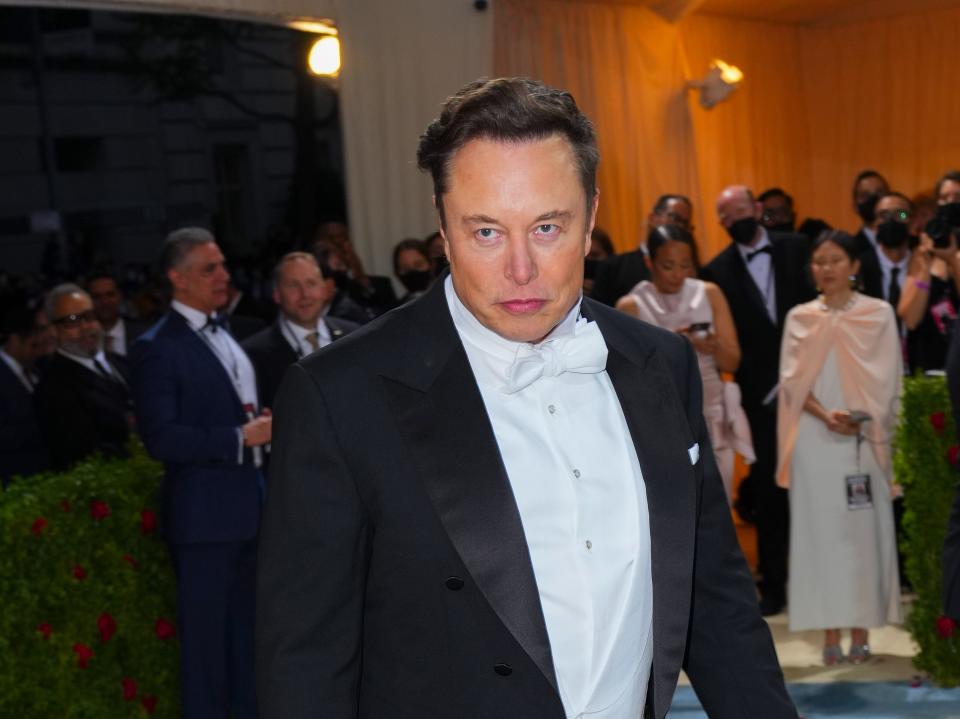Elon Musk's countersuit against Twitter says the company is operating a 'scheme' to mislead investors

Elon Musk filed counterclaims against Twitter that contain allegations about its user metrics.
He accused the company of trying to "distract" from what he called its many "misrepresentations."
Twitter pushed back, saying the billionaire's story was "implausible and contrary to fact."
The 164-page countersuit that Elon Musk confidentially filed against Twitter is full of accusations around the validity of the social-media company's business claims.
Insider obtained a copy of the countersuit, which is another escalation of the legal fight over Musk's attempt to back out of his $44 billion agreement to buy Twitter. The billionaire and the platform are scheduled to face off in an October trial in Delaware court over whether he is legally able to walk away from his deal to acquire the platform.
In his counterclaims, Musk argues at length that he is entitled to drop the deal. He says he was led to believe through Twitter's public assurances to investors that its business, built around user metrics, was sound. He alleges they are far from it. For months, Musk has argued publicly that Twitter had more spam accounts, known as bots, than it has acknowledged. After pushing for more information about the issue, he at the start of July sought to call off the deal.
Now, he is accusing the company of intentionally "miscounting" the number of spam accounts it hosts to juice its user metrics as part of what he called "its scheme to mislead investors about the company's prospects." He also describes it as misleading for Twitter to rely on the metric mDAU, or monetizable daily active Twitter users, as a basis of revenue. And at the same time, Musk claims Twitter actually has 65 million fewer daily users than it says. He says users who see ads, and should be considered "monetizeable," are as low as 16 million.
His counterclaims also say Twitter's lawsuit to enforce the merger agreement is "filled with personal attacks against Musk and gaudy rhetoric more directed at a media audience than this court" and "is nothing more than an attempt to distract from these misrepresentations."
"That has been Twitter's strategy all along: to distract from and obfuscate the truth about its disclosures — first from its investors and then from the Musk Parties when they began to discern the truth," the claims continue.
Twitter pushed back on Musk's accusations. It filed a reply with the court after-hours calling the billionaire's claims "a story" concocted "in an effort to escape a merger agreement that Musk no longer found attractive once the stock market — and along with it, his massive personal wealth — declined in value."
"The counterclaims are a made-for-litigation tale that is contradicted by the evidence and common sense," Twitter added.
Musk's counterclaims were initially not available to the public because Twitter's lawyers argued they contained private company information that needed to be redacted. After days of back and forth between lawyers on each side, the judge overseeing the case in Delaware Chancery Court said the suit needed to be made public by Friday.
Musk faces an uphill battle in his efforts to back out of the deal, given the ironclad contract he signed earlier this year.
But his countersuit is an attempt to create a path out of the deal. While Twitter has pointed out repeatedly that Musk waived his right to information before signing the merger agreement, Musk says he was going the traditional route of "trust but verify," meaning he trusted Twitter's public disclosures and went about validating them after, and negotiated the right to do so.
The complaint said Musk's side "fully expected that Twitter would hide nothing from its would-be owner, including about the magnitude of its false or spam account problem."
"Instead, the opposite happened," it continued. "Twitter played a months-long game of hide-and-seek to attempt to run out the clock before the Musk Parties could discern the truth about these representations, which they needed to close. The more Twitter evaded even simple inquiries, the more the Musk Parties grew to suspect that Twitter had misled them."
Musk accused the company of intentionally misleading him. The counterclaims argue that the platform's process of user authentication is weak and that the company doesn't send email, text, or other push notifications to users to verify them. The counterclaims also say CEO Parag Agrawal couldn't explain to Musk how the company selected which accounts to run by human moderators.
Twitter has handed Musk massive amounts of information on accounts and users. Though Musk's claims refer to it as "limited," they go on to say that analysis so far has produced "shocking results." In early July, for instance, a review carried out by Musk's experts concluded "one-third of visible accounts may have been false or spam accounts." To him, this means a "conservative floor" for spam accounts on the platform is 10%, not the 5% Twitter publicly says.
Musk argues that this, combined with the allegation that Twitter's mDAU's are much lower than it has said, means he has the right to terminate his deal to acquire the company. Musk asked the court to rescind the merger agreement and for undisclosed compensatory damages.
Are you a Twitter employee or do you have insight to share? Contact Kali Hays at khays@insider.com, on secure messaging app Signal at 949-280-0267, or through Twitter DM at @hayskali. Reach out using a nonwork device.
Read the original article on Business Insider

 money
money 